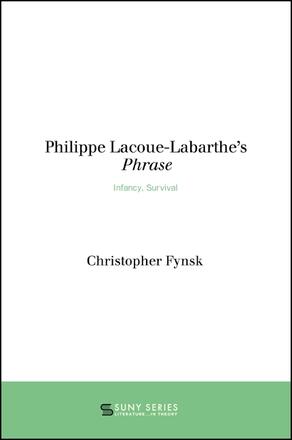
Philippe Lacoue-Labarthe's Phrase
Infancy, Survival
Alternative formats available from:
First sustained critical reading of Lacoue-Labarthe's Phrase, which provides insights into a philosophically inspired work of prose poetry.
Description
This book presents an interpretation of a volume of poetry and theoretical reflections (Phrase) by the late Philippe Lacoue-Labarthe, who is widely known as one of the major contributors to thinking about the relation between philosophy and literature in the continental tradition. His work has shaped the deconstructive approach to the question of the subject and has opened important paths of research relating to the topic of literary mimesis. Along with Jean-Luc Nancy, he made very important contributions in the areas of romantic literary theory and psychoanalytic theory.
Christopher Fynsk's analysis of Phrase focuses principally on two of its key motifs. Fynsk first deals with the theme of infancy and draws forth the deep relation to Blanchot that is revealed in this text. The second motif which organizes the narrative of the autobiographical component of Phrase (which Lacoue-Labarthe entitles "a history of renunciation") names the condition of modern poetic speech. Thus, Fynsk interprets the history of renunciation and elucidates the meaning of what Lacoue-Labarthe terms "literature. "
Christopher Fynsk is Dean of the Division of Philosophy, Art, and Critical Thought at the European Graduate School, Switzerland. He is the author of several books, including Last Steps: Maurice Blanchot's Exilic Writing.
Reviews
"This is a unique study on the interrelation between the literary and the theoretical that answers to the equally singular quality of Lacoue-Labarthe's writing. " — Susan Bernstein, Brown University
"If there are still some who would have it that the heady stuff of theory is necessarily arid, this book should forever putthat fallacy to rest. From the beginning, its hard-won arguments are compelling, provocative, and moving. " — Jan Plug, University of Western Ontario